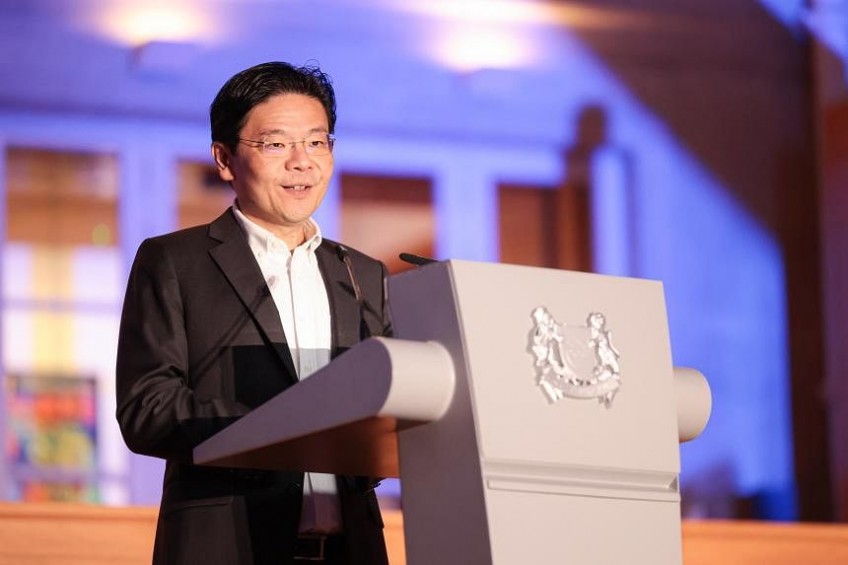DPM Wong: Singapore to triple AI talent pool to 15,000 as part of national strategy update


SINGAPORE – Artificial intelligence (AI) is no longer something good to have but is a subject that people must know, according to a renewed AI strategy to take Singapore forward in the global race.
Announcing the revised national game plan on Dec 4, Deputy Prime Minister Lawrence Wong said: “Knowledge-based work like research, coding and writing was considered safe from disruption in the past. But with AI, that is no longer the case,” he said, referring to recent breakthroughs in generative AI.
Specifically, developments in generative AI such as ChatGPT, which are capable of creating text, images and other media, have put advanced AI tools with near-human-like intelligence in the hands of anyone with an Internet connection.
Likening using these tools to entering uncharted territory, DPM Wong said Singapore has to take a more systematic way to harness the benefits of AI for public good while mitigating its impact on jobs and livelihoods, as well as other risks such as deepfakes, scams, cyber attacks and misinformation.
Thus, there is a need to update Singapore’s original AI strategy, first launched in 2019.
Dubbed National AI Strategy 2.0: AI for the Public Good for Singapore and the World, the new strategy focuses on nurturing talent, promoting a thriving AI industry and sustaining it with world-leading infrastructure and research that ensures AI serves the public good.
“The Government plans to invest significantly in adult education and training to reskill and upskill our workers,” said DPM Wong, who was speaking at the National Gallery to a room of global tech industry leaders gathered for the Singapore Conference on AI, held between Dec 4 and 6.
The revised strategy expands Singapore’s focus in the inaugural 2019 strategy, which was mostly aimed at deploying AI use cases in specific sectors such as healthcare, security and education.
Explaining the overhauled strategy, DPM Wong said: “Recent breakthroughs in AI have sparked renewed interest about the potential of AI, its risks and implications to humanity... Discussions about AI’s potential benefits and threats are not new, but we are venturing into uncharted territory.”
To nurture talent here, Singapore aims to triple its number of AI practitioners to 15,000 by training locals and hiring from overseas, said DPM Wong, who is also Minister for Finance.
The group includes data and machine-learning scientists and engineers who are the backbone of translating AI into real-world apps, said DPM Wong.
Addressing fears of jobs being replaced by AI, he said there is likely to be significant changes in job roles, and the Government will invest significantly in training to ensure that workers here can adapt.
Many AI-related firms here are using AI on a project basis and for specific uses, but they can do more to build a thriving AI industry, said DPM Wong, who urged firms to create new AI models and find ways to deploy them for wider use cases.
“These centres can go beyond the needs of the specific company and benefit the wider industry,” he said. “There is potential for such industry-wide platforms in key areas like advanced manufacturing, financial services and biomedical studies, where Singapore is already operating at the leading edge.”
Researchers will also focus on ways the technology can improve its understanding of logical and physical concepts and be able to explain its answers. Research will also look into responsible AI as a response to concerns about the biases in AI datasets and the accuracy of its answers.
Singapore will back its ambitions with computing power and infrastructure to meet the needs of the growing industry, said DPM Wong.
“We will not be able to compete with the major powers in assembling raw computing power, but we will do everything we can to ensure that we have the computing power to meet our growing research and industry demands, and to fully back our strategic AI agenda.”
The Government will build a trusted environment for AI and address moral and ethical issues in the field, such as whether AI is suited to make decisions in place of humans.
DPM Wong cited how nations are grappling with the negative consequences of social media, like cyber bullying and misinformation, adding that governments now have to play an active role to shape AI, which has raised even more profound issues.
Singapore will find a pragmatic balance to regulation without choking innovation, he said.
“The key in all this,” he added, “is to be agile and nimble and to keep updating our strategies and government frameworks as circumstances change.”
This article was first published in The Straits Times. Permission required for reproduction.